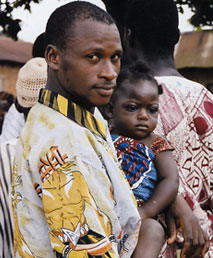World Population Day – July 11, 2007
 |
| Source: Melissa May/Courtesy of Photoshare |
Engaging Men in Family Planning
World Population Day 2007 focuses on the importance of male involvement in improving health outcomes around the globe. USAID’s Office of Population and Reproductive Health recognized more than a decade ago that most reproductive health programs fail to significantly address the influence men have on their own health, the health of women, and the health of their families. The work that USAID funds in this area promotes gender equity with regard to reproductive health; increases men's support for women's reproductive health and children's well-being; and advances the reproductive health of both men and women. Of special interest are approaches that focus on redefining programs to include men in more constructive ways – as clients, supportive partners, and agents of social change for reproductive health and development.
Key Themes of Interest
- Providing services to accommodate men as clients and partners
- Reducing provider bias and increasing providers' competency when working with men and couples
- Supporting gender-equitable men as leaders and advocates
- Engaging young and older men and communities in reflecting upon and redefining traditional male norms
- Innovating strategies to reach men
USAID Success Stories
Resources
SysteMALEtizing [PDF, 836KB]
This electronic brochure, prepared by Margaret Greene for the Interagency Gender Working Group (IGWG) and funded by USAID, provides many of the key resources for working with men as well as a framework for distinguishing among varied programs, illustrating the range of options with examples.
A Summary of the 'So What?' Report: A Look at Whether Integrating a Gender Focus Into Program Makes a Difference to Outcomes [PDF, 996KB]
This brief, developed for policymakers and program managers, presents evidence that integrating gender into reproductive health programs makes a difference to both reproductive health and gender outcomes. It was produced through collaboration between the IGWG and WHO's Department of Gender, Women and Health. (July 2005)
Addressing Gender-Based Violence From the Reproductive Health/HIV Sector: A Literature Review and Analysis [PDF, 584KB]
Gender-based violence is a pervasive public health and human rights problem that results in negative consequences for women's health and well-being, their families, and societies in general. This IGWG-commissioned report for USAID's Bureau for Global Health reviews and analyzes the literature for programs in developing countries that have addressed or challenged gender-based violence related to the reproductive health and HIV sectors. (May 2004)
Involving Men in Sexual and Reproductive Health: An Orientation Guide
The IGWG Men and Reproductive Health Subcommittee produced Involving Men in Sexual & Reproductive Health: An Orientation Guide on CD-ROM. Intended as a tool for program designers and managers, policymakers, NGOs, and community groups, the guide facilitates information sharing, aids program design and planning, and provides advice about advocating for improved sexual and reproductive health programs and services.
|


